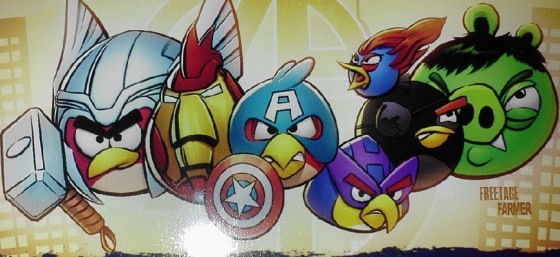
I spoke at Phoenix Comicon last week on fair use and fan fiction. I had a great group of people in my audience with who had ideas of turning novels into graphic novels and who wanted to know more about the legalities of things like the Phoenix Comicon badges. This year’s badge featured a parody of Angry Birds and The Avengers.

Fair use is a defense against claims of copyright infringement. What generally occurs in these situations is you use someone else’s work in a project, the original copyright owner sues you for copyright infringement, and you respond with an argument that you used the copyright owner’s work but that your use was transformative enough to qualify for protection under the fair use doctrine. The court considers four factors to determine if your use of another’s work is protected by fair use.
- Purpose and character of your use of another’s work
- Nature of the copyrighted work
- Amount and substantiality of the copyrighted work used
- Effect on the market
These cases are evaluated on an individual basis. There’s no mathematical equation to determine if you’re protected by fair use. The main factor the court considers is whether your work becomes a substitute for the other person’s work. Parodies are generally transformative enough to qualify for fair use. Let’s look at the fair use factors in regards to the Angry Birds/Avengers badge.
- Purpose and character: Phoenix Comicon is a commercial venture, but attendees are paying to attend the con, not specifically to buy the art on the badge.
- Nature of the copyrighted work: Both Angry Birds and The Avengers have been previously published. One is a game, the other is a movie. The original copyright owner is generally favored if the work was not previously published.
- Amount and substantiality used: The looks of the birds and the Avengers were copied. The looks of both were required for the audience to understand the parody.
- Effect on the market: It’s unlikely that someone will seek out Angry Bird art or Avenger art and accept this as a suitable substitute. No one will use this picture as a substitute for the video game or the movie.
Was this badge protected by fair use? Probably, but I’m not a judge and it’s not my call to make.
When it comes to fan fiction, an artist isn’t going to get in trouble if the copyright owner doesn’t know about your work or if they don’t mind that their fans create their own work. If you’re really worried about getting in trouble, you can always ask the copyright owner for permission or a license to use their work.
Fan fiction and fair use are fact specific issues. When in doubt, consult an attorney.
Feel free to connect with me via Twitter, Google+, Facebook, and LinkedIn.
Please visit my homepage for more information about Carter Law Firm.
